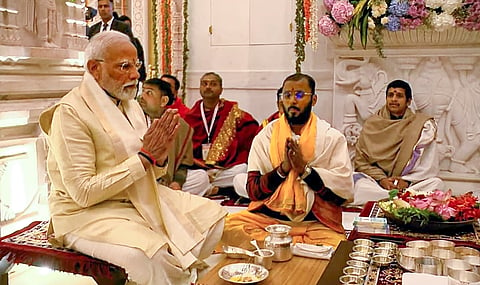

Shortly after the consecration ceremony of the Ram temple in Ayodhya on Monday, January 22, Prime Minister Narendra Modi, in his speech, expressed his gratitude to the judiciary for “justice” by allowing construction of Ram Temple. A Supreme Court verdict of 2019, had decided to hand over the disputed land on which the Babri Masjid mosque once stood, for the construction of a Hindu temple.
Addressing the gathering on Monday, PM Modi said that even after the Indian Constitution was formed, there was a legal battle surrounding the existence of Lord Ram, “The legal battle regarding the existence of Lord Ram went on for decades. I express my gratitude to the Indian judiciary for doing justice and allowing the legal construction of Ram temple,” said PM Modi.
In 2019, a five-judge bench comprising of the then Chief Justice of India Ranjan Gogoi, CJI-designate SA Bobde and Justices DY Chandrachud, Ashok Bhushan and S Abdul Nazeer ruled that the 2.77 acres of disputed land in Ayodhya be handed over to a trust under the Government of India, for the construction of Ram temple and an alternative 5 acres of land in another area to the Uttar Pradesh Sunni Central Waqf Board for the purpose of building a mosque.
In his speech, the Indian PM also sought “forgiveness” from Lord Ram as they “could not complete the construction of the temple for so long”.
In the 2019 SC ruling, the Court had observed that the demolition of the Babri Masjid in 1992, followed by the riots, which led to the deaths of over 2,000 people, was a “calculated act of destroying a place of public worship” and also said that the Muslim community had been "wrongly deprived of a mosque constructed well over 450 years ago".
Babri Masjid, built by Mir Baqi, commander of Mughal emperor Babur in 1528, was demolished by kar sevaks belonging to Hindu majoritarian outfits on December 6, 1992. The demolition, which happened as a result of a concerted Ram Janmabhoomi movement, resulted in communal riots over months, which led to over 2,000 deaths. The Babri Masjid has been a contested site since 1885 as religious leaders and Hindutva outfits considered it to be Ram Janambhoomi or the birthplace of Lord Ram in Ayodhya.
A legal fight ensued in 1950 when Gopal Visharad Sharma approached Faizabad district court for the right to worship idols of Ram Lalla, which were placed there in 1949. On September 30, 2010, the High Court, in a 2:1 majority, ruled a three-way division of the disputed area between the Sunni Waqf Board, the Nirmohi Akhara and Ram Lalla.
Nine years later, in 2019, the Supreme Court granted the entire 2.77 acres of disputed land to deity Ram Lalla and directed the Uttar Pradesh government to allot five acres of land to Muslims for building a mosque. Though the Supreme Court referred to the mosque's demolition as "an egregious violation of the rule of law," the verdict was criticised for accepting the logic of "faith over fact" and granting legal possession of land to those responsible for the demolition.